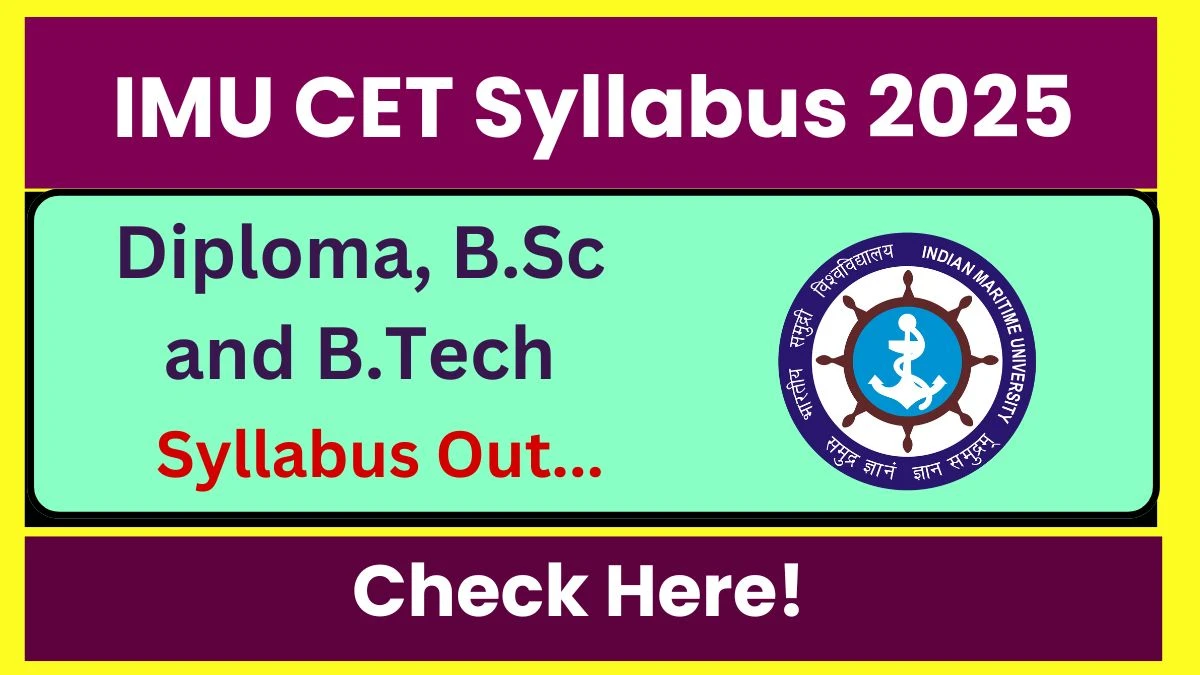IMU CET Syllabus 2025
The IMU CET Syllabus 2025 is designed to assess the knowledge and aptitude of candidates seeking admission to various undergraduate and postgraduate courses offered by the Indian Maritime University (IMU). For undergraduate programs like Diploma, B.Sc and B.Tech (Marine Engineering, Naval Architecture), the syllabus is based on the Class 11 and 12 level subjects, primarily focusing on Physics, Chemistry, Mathematics, English, and General Knowledge.
The Physics section covers topics like laws of motion, thermodynamics, optics, and electromagnetism, while Chemistry includes organic, inorganic, and physical chemistry concepts. Mathematics consists of algebra, calculus, coordinate geometry, and trigonometry. English language proficiency is tested through grammar, vocabulary, comprehension, and sentence correction.
| Information | Details |
| Company Name | Indian Maritime University |
| Exam Name | Common Entrance Test |
| Course Name | Diploma, B.Sc and B.Tech |
| Category | Syllabus |
| Status | Out |
| IMU CET Syllabus 2025 | Click Here |
| Official Site | imu.edu.in |
What is the IMU CET Syllabus 2025?
English:
- Parts of Speech
- Word/Phrase Meanings
- Antonym & Synonym
- Active/Passive Voice
- Tenses
- Idioms
- Phrasal Verbs
- One word Substitution
- Fill in the blanks with
- prepositions
Chemistry:
- Chemical Bonding and
- Molecular Structure
- Thermodynamics
- Organic Chemistry:
- Nomenclature and Named
- Reaction
- Electrochemistry
- Solutions
- General Principle and Process
- of Isolation of Elements
- State of Matter
- Chemistry in everyday life
- Chemical Kinetics
- Chemical Equilibrium
Aptitude and GK:
- Logical Reasoning
- Critical Reasoning
- Arithmetic Reasoning
- Structural Analysis
- Instruction Based Questions
- Completion of Number/Pattern Series
- Odd One Out
- Data Sufficiency and Interpretation
- Coding Decoding
- Blood Relation
- Pipes and Cisterns
- Boat and Streams
- Numerical Computation and Estimation
- Sitting Arrangement
- Calendar
- Clocks
- Stocks
- Time & Work
- Time & Distance
- Height & Distance
- Ratio & Proportion
- Profit & Loss
- Percentage
- Simple and Compound Interest
- Error Finding
General Knowledge:
- Geography
- Current Affairs(National & International)
- Shipping Related News
- Ministers, Maritime Days, Significance of States of India
- Significance of Rivers, Dams, Seas, Oceans, Canals, Lakes etc...
Physics:
- Kinematics
- Newton’s Laws of Motion
- Thermodynamics
- Oscillations
- Simple Harmonic Motion
- Work, Energy & Power
- Electric Charges & Fields
- Electrostatic Potential &
- Capacitance
- Current Electricity
- Magnetic Effect of Current and
- Magnetism
- Electromagnetic Induction
- Alternating Current
- Ray Optics
- Wave Optics
- Atoms
- Nuclei
- Dual Nature of Radiation &
- Matter
- Semiconductor
- Motion in a Straight Line
- Motion in a Plane
Mathematics:
- Complex Numbers & Quadratic
- Equation
- Straight Lines
- Conic Section & Circles
- 3-D Geometry
- Sets
- Trigonometric Functions
- Probability
- Relation & Function
- Matrices & Determinant
- Limits & Derivatives
- Continuity & Differentiability
- Application of Derivatives
- Integrals
- Application of integrals
- Vector Algebra
- Arithmetic Progression
- Geometric Progression
- Permutation & Combination
- Statistics (Basic Class 10th)
- Differential Equations
- Mensuration
IMU CET Syllabus 2025 More Details:
| Details | Information |
|---|---|
| Frequency of Exam | Once per Year |
| Total No. of Questions | 200 |
| Time Duration | 180 minutes (3 Hours) |
| Marking Scheme | - +1 mark for each correct answer - -0.25 mark for each wrong answer - 0 mark for unattempted questions |
Tips to prepare for IMU CET:
Step 1: Understand the Exam Pattern and Syllabus
- Check the official IMU CET 2025 exam pattern and syllabus thoroughly.
- Familiarize yourself with all topics and sections to be well-prepared for the exam.
Step 2: Create a Personalized Study Timetable
- Prepare a detailed study schedule covering the entire syllabus.
- Allocate specific time for each subject and topic.
- Include dedicated time slots for revision and mock tests.
Step 3: Take Notes of Important Topics
- While studying, make concise notes of important and difficult topics.
- Use these notes for quick revision anytime, anywhere.
Step 4: Practice Regular Mock Tests
- Attempt mock tests regularly to assess your preparation level.
- Analyze your performance and identify commonly made mistakes.
- Work on weak areas to improve accuracy and speed.
Step 5: Revise Daily
- Set aside time for daily revision to strengthen your memory.
- Regular revision reduces the chances of forgetting what you have studied earlier.

